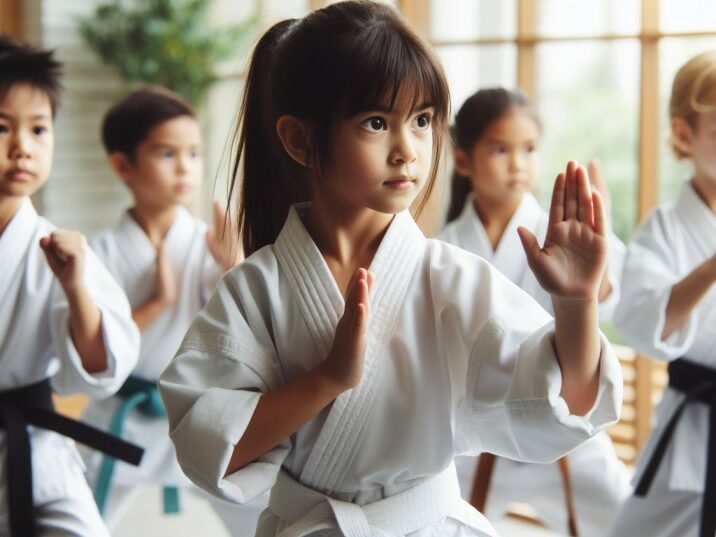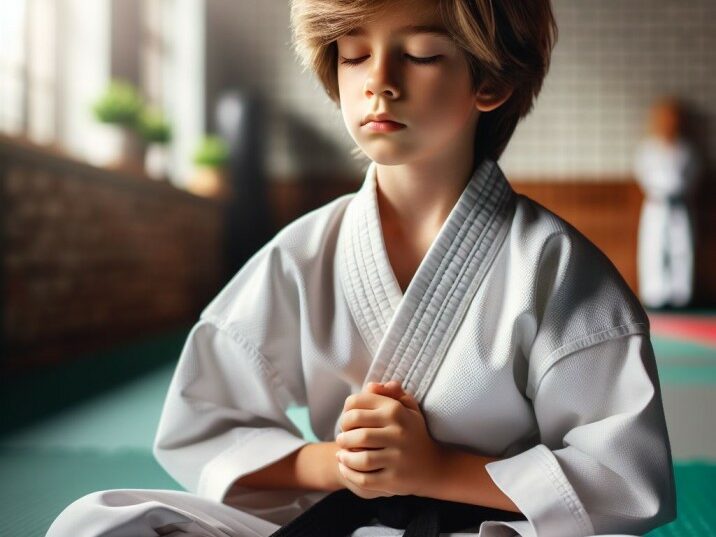Introduction:
Table of Contents
Karate Is Good for Kids with Anxiety?
In a world filled with uncertainties, anxiety has become an increasingly prevalent concern among children. Parents seek effective ways to help their kids manage stress and build resilience. One intriguing avenue that has gained attention is karate. This article delves into the question: karate is good for kids with anxiety?

The Power of Karate:
Karate, a traditional martial art originating from Okinawa, Japan, is not merely about kicks and punches; it encompasses discipline, focus, and self-control. These attributes make karate an intriguing option for children grappling with anxiety.
Confidence Building Through Karate:
One of the key aspects of karate is the emphasis on self-confidence. As children progress through the ranks, they gain a sense of achievement, fostering self-esteem. The structured belt system in karate serves as a tangible representation of progress, helping anxious children build confidence gradually.
Discipline as a Coping Mechanism:
Karate instills discipline through its rigorous training routines. For kids with anxiety, the predictable structure of karate classes can provide a sense of stability. The repetitive nature of practicing forms and techniques becomes a coping mechanism, promoting a calming effect on the mind.
Emotional Expression in a Controlled Environment:
Children often struggle with expressing emotions, especially anxiety. Karate offers a unique outlet for emotional expression within a controlled environment. Through katas and sparring, kids learn to channel their energy constructively, reducing anxiety-related tension.
Karate and Mindfulness:
Mindfulness is a crucial component in managing anxiety. Karate requires participants to be fully present in the moment, concentrating on movements and techniques. This mindfulness practice can aid in redirecting anxious thoughts and promoting mental clarity.

| Benefit | Description |
|---|---|
| Confidence Building | Gradual progression through belt levels boosts self-esteem. |
| Discipline | Karate’s structured routines provide stability and discipline. |
| Emotional Expression | Children learn to express emotions in a controlled environment. |
| Mindfulness | Karate promotes mindfulness, aiding in anxiety management. |
In this exploration of whether karate is good for kids with anxiety, we find that the martial art provides not only physical benefits but also crucial emotional support. karate is good for kids with anxiety? The answer lies in the holistic approach that karate takes towards mental well-being.
Conclusion:
In conclusion, karate Is good for kids with anxiety, karate holds immense potential as a tool for managing anxiety in kids. Its unique blend of physical activity, discipline, and mindfulness offers a holistic approach to emotional well-being. By fostering confidence, discipline, and emotional expression in a controlled environment, karate empowers children to navigate the challenges of anxiety.
FAQs:
- Can karate help my anxious child build confidence?
- Yes, the structured progression in karate, marked by belt levels, contributes significantly to boosting self-confidence.
- How does karate promote discipline?
- Karate classes follow a structured routine, instilling discipline through consistent practice and adherence to principles.
- Is karate suitable for all children with anxiety?
- While individual preferences vary, many children find karate beneficial. It’s advisable to consult with instructors to assess suitability.
- Can karate be a form of therapy for anxious kids?
- Karate provides a physical and emotional outlet, potentially serving as a therapeutic activity. However, it should complement professional therapy when needed.
- What age is appropriate to start karate for anxiety management?
- Many karate schools accept children as young as four or five. However, it’s essential to consider the child’s individual readiness and preferences.
- Are there specific karate techniques beneficial for anxiety reduction?
- Karate techniques that involve controlled breathing and mindfulness, such as katas, can be particularly helpful for anxiety reduction.
- How can parents support their child’s karate journey for anxiety management?
- Parents can offer encouragement, attend classes when possible, and maintain open communication with both their child and karate instructors.
- Q: Can karate worsen anxiety in kids due to its physical nature?
- A: No, when practiced in a supportive environment, karate can provide an outlet for stress and anxiety, promoting physical fitness and emotional well-being.
- Q: Are there specific age groups where karate is more effective in addressing anxiety in children?
- A: Karate can be beneficial for a range of age groups, but it’s essential to consider a child’s readiness. Many karate schools accept children as young as four or five.
- Q: How can karate help children cope with anxiety outside of the dojo?
- A: Karate promotes discipline and mindfulness, skills that children can carry into daily life, aiding in anxiety management and emotional regulation.
- Q: Is there a risk of injury in karate that might add to a child’s anxiety?
- A: Properly supervised and age-appropriate karate classes minimize the risk of injury. In fact, karate can enhance coordination and body awareness, reducing the likelihood of accidents.
- Q: Can children with severe anxiety benefit from karate, or is it more suitable for mild cases?
- A: While individual responses vary, many children with various anxiety levels find karate beneficial. It’s advisable to consult with instructors to assess suitability on a case-by-case basis.
- Q: How can parents support their child’s interest in karate without adding pressure?
- A: Encouragement and open communication are key. Parents should support their child’s journey without imposing unrealistic expectations, allowing them to enjoy the process.
- Q: Are there specific karate techniques that focus on relaxation and stress reduction?
- A: Yes, karate involves controlled breathing and mindfulness practices, especially in techniques like katas, which can aid in relaxation and stress reduction.
- Q: What signs should parents look for to determine if karate is positively impacting their child’s anxiety?
- A: Positive signs include increased self-confidence, better emotional regulation, and a general sense of well-being. Parents should also observe if their child enjoys and looks forward to karate classes.
- Q: Can karate be integrated into a broader anxiety management plan for children, including therapy and other activities?
- A: Absolutely. Karate can complement other therapeutic approaches. Collaboration with instructors and mental health professionals ensures a holistic and tailored approach.
- Q: How can instructors create a supportive environment for anxious children in karate classes?
- A: Instructors can foster a supportive atmosphere by understanding individual needs, encouraging open communication, and adapting teaching methods to accommodate various comfort levels.


